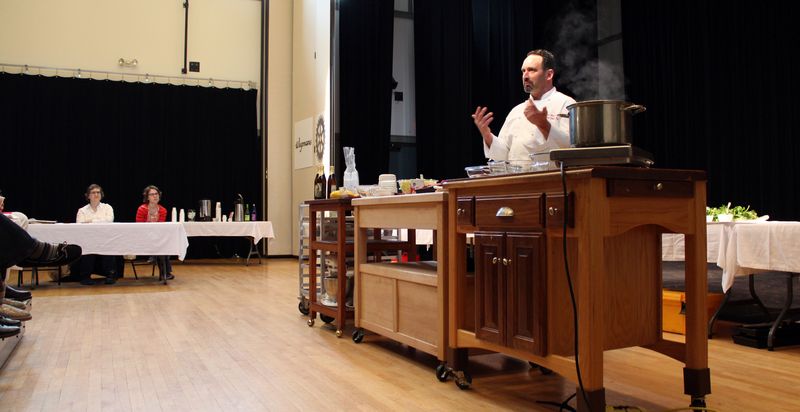By Rochelle Bilow, Finger Lakes Food Correspondent
Most celebrity chefs guard their secrets closely, denying consumers and fans their recipes and techniques. And why should they share? It’s their repertoire, after all. There’s a certain unspoken fear in the restaurant world that if clients can replicate dishes on their own, the banquettes and bar stools will slowly empty as home ovens steadily warm to a roaring fire.
The chefs in the Finger Lakes believe otherwise. For years, a core group of culinary professionals in the region have been teaching specialized and themed classes to laypeople, unraveling the mystery and mystique of their craft at 171 Cedar Arts in Corning one Saturday morning at a time.
This eagerness to educate grows out of a strong feeling of community within the Finger Lakes culinary scene. As a developing wine tourism region, there is still only a small handful of serious eateries and restaurants. Those involved feel a deep sense of pride not just in the food they create, but in the work of their peers as well. I asked Brud Holland, of Red Newt Bistro, if it was an unspoken rule for Finger Lakes chefs to participate in the program. Says Holland, who has been teaching with here since 1999: “There’s a natural tendency in how I cook to educate, so that part came very naturally. It seemed important.”
When Holland first started, the classes were – and still are – overseen by Neal O’Donnell, Director of the 171 Cedar Arts Culinary Program. The educating chefs originally taught at Sullivan Kitchen in Bath and then the World Kitchen Headquarters. The program finally found a home at 171 Cedar Arts Center, located at 171 Cedar St.
The organization’s website states its mission clearly: to “[provide] the community with a warm, friendly home in which to explore the arts.” The concept was implemented in 1968, and since then dancers, artists, musicians, thespians, athletes and cooks have found a home in which to practice their craft and teach the community.
The culinary classes are popular, perhaps in part because of the interest in food and wine that engulfs the Finger Lakes region. When chefs like Suzanne Stack of Suzanne Fine Regional Cuisine and Scott Signori of Stonecat Cafe are speaking, people listen. Each chef is given the freedom to create the menu they’d like to teach, and in what format. While the class themes encompass everything from vegan recipes to cooking with local produce, the general goal is the same: to raise awareness of what’s good, what’s fresh, and who’s making it in the Finger Lakes.
The current schedule of classes, held on Saturday mornings until May 5, has classes clocking in at three hours, running from 10am to 1pm. In a culture of 22-minute cooking shows, that’s a long time for a chef to teach. Holland admits that most chef-educators actually extend that time by arriving hours ahead of time to prep and prepare their mise en place. It’s also a long time for students to sit and watch hungrily as increasingly delicious smells waft up from the make-shift kitchen in the Drake House auditorium – but with samples and tastes passed liberally, no one ever seems to complain.
I attended a class on February 11, titled “Romance at Breakfast” and taught by chef Debbie Meritsky of the Black Sheep Inn in Hammondsport. (I had previously written a profile of her, here.) Her menu was ambitious, and included recipes for brioche, poached eggs with beurre blanc, scrambled eggs with caviar, grain-free granola and coeur a la crème, an almost savory dessert made from basket or cream cheese and dressed with raspberry coulis.
Each student was given a clipboard with copies of the recipes, so they could follow along and write notes. And that they did – for the first two hours, they wrote furiously, scribbling substitutions, tips and anecdotes from Meritsky in the margins. The atmosphere at the start of the session was timid and shy, though no doubt ameliorated by Meritsky’s boundless enthusiasm and O’Donnell’s colorful and ebullient presence. (Holland has referred to him, quite aptly, as the program’s “consummate storyteller and emcee.”) By the time the mini brioche loaves were proofing on the back of the stove, students were calling out questions and murmuring to one another in the audience.
Two culinary students from BOCES had volunteered to help with the prep work. At one point, Meritsky asked a student if she had ever made a remoulade sauce. When the young girl shook her head, Meritsky handed over the ingredients and recipe and told her to demonstrate the process. “Just wing it,” she said.
A twitter and chuckle went through the audience, and then a sigh of relief that seemed to say, “It’s okay. We’re all here to learn.”
Not only is that the atmosphere in the culinary classes at 171 Cedar Arts, it’s the goal – for everyone involved. Says O’Donnell: “I enjoy seeing the chefs evolve into terrific instructors.”
The chefs teach in a make-shift kitchen cobbled together from old butcher’s blocks, tables and shelving units. The range is electric instead of oft-preferred gas, and access to running water is a few steps away in a prep area, but that doesn’t deter anyone from signing up to teach. Besides, says Holland, that’s just the way they intended it. “Back when we were like nomads, we were trying to create a mobile kitchen that could be packed up and brought anywhere.”
The result is a space that’s homey and eclectic. First-time and returning students feel a no-pressure familiarity when they realize that 171 Cedar Arts isn’t a stainless-steel wasteland of exclusionary cooking terms and techniques. It’s real cooking, by real chefs – for real people.
Curious home cooks can attend a class for $50 ($42 for members), and the three-hour instruction includes tastes and samples of everything made. To sign up for a class, call (607) 936-4647 or visit 171cedararts.org.

